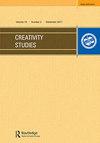THE INFLUENCE OF PHILOSOPHICAL MENTALITY AND SPIRITUAL INTELLIGENCE ON CREATIVITY OF EMPLOYEES MEDIATED BY ORGANIZATIONAL COMMITMENT
Q1 Social Sciences
引用次数: 0
Abstract
The root of organizational creativity depends on employee’s creativity and any factor increasing the staff ’s creativity. In recent years, specific features of the mind and the role of emotions in people are considered a competitive advantage that has been at the center of attention by organizations. Therefore, the present study focused on the relationship between spiritual intelligence and philosophical mentality on employee creativity and the mediating role of organizational commitment. To analyze the conceptual model of research, philosophical mentality the Smith’s Wellbeing Questionnaire for Workers, spiritual intelligence King’s Questionnaire, organizational commitment Allen and Meyer’s Organizational Commitment Scale, and organizational creativity Randsip’s Creativity Questionnaire were used for collecting data. Data analysis was performed using Pearson correlation coefficient and analysis of variance. The statistical sample included 278 employees of factories located in industrial towns of Isfahan, Iran. The results indicated the positive relationships between philosophical mentality and creativity, philosophical mentality and organizational commitment, spiritual intelligence and employee creativity, spiritual intelligence and organizational commitment, organizational commitment, and employee creativity. In addition, philosophical mentality and spiritual intelligence can affect the employee’s creativity through organizational commitment as a mediator variable.哲学心态、精神智力在组织承诺中介下对员工创造力的影响
组织创造力的根源在于员工的创造力和任何能提高员工创造力的因素。近年来,心理的特定特征和情绪在人们身上的作用被认为是一种竞争优势,一直是组织关注的中心。因此,本研究主要探讨精神智力和哲学心态对员工创造力的影响以及组织承诺的中介作用。为了分析研究的概念模型,采用哲学心态的史密斯员工幸福感问卷、精神智力的King问卷、组织承诺的Allen and Meyer组织承诺量表、组织创造力的Randsip创造力问卷进行数据收集。数据分析采用Pearson相关系数和方差分析。统计样本包括位于伊朗伊斯法罕工业城镇的278名工厂雇员。结果表明,哲学心态与创造力、哲学心态与组织承诺、精神智力与员工创造力、精神智力与组织承诺、组织承诺与员工创造力存在正相关关系。此外,哲学心态和精神智力可以通过组织承诺作为中介变量影响员工的创造力。
本文章由计算机程序翻译,如有差异,请以英文原文为准。
求助全文
约1分钟内获得全文
求助全文
来源期刊

Creativity Studies
Social Sciences-Cultural Studies
CiteScore
3.20
自引率
0.00%
发文量
38
审稿时长
15 weeks
期刊介绍:
Creativity Studies accepts original research articles with a focus on communication within the creative society. The journal welcomes contributions from scholars from diverse disciplines such as philosophy, sociology, history, political, communication and information sciences. Creativity Studies also publishes survey papers and descriptions of academic events in this area. The journal issues will be organized around different issues on creativity.
 求助内容:
求助内容: 应助结果提醒方式:
应助结果提醒方式:


